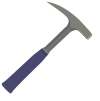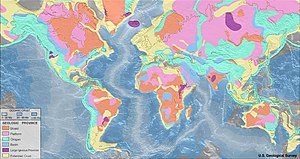Outline of geology
| Part of a series on |
| Geology |
|---|
 |
The following outline is provided as an overview of and topical guide to geology:
Geology – one of the Earth sciences – is the study of the Earth, with the general exclusion of present-day life, flow within the ocean, and the atmosphere. The field of geology encompasses the composition, structure, physical properties, and history of Earth's components, and the processes by which it is shaped. Geologists typically study rock, sediment, soil, rivers, and natural resources.
Branches of geology
[edit]Geology applies primarily to Earth, but can be applied to any planet or extraterrestrial body.
Geology of Earth
[edit]Subdisciplines of geology:
- Biogeology – Study of the interactions between the Earth's biosphere and the lithosphere
- Economic geology – Science concerned with earth materials of economic value
- Engineering geology – Application of geology to engineering practice
- Environmental geology – Science of the practical application of geology in environmental problems.
- Geochemistry – Science that applies chemistry to analyze geological systems
- Geologic modelling – Applied science of creating computerized representations of portions of the Earth's crust
- Geomorphology – Scientific study of landforms
- Geophysics – Physics of the Earth and its vicinity
- Historical geology – Study of the geological history of Earth
- Hydrogeology – Study of the distribution and movement of groundwater
- Marine geology – Study of the history and structure of the ocean floor
- Mineralogy – Scientific study of minerals and mineralised artifacts
- Mining geology – Extraction of valuable minerals or other geological materials from the Earth
- Paleontology – Study of life before the Holocene epoch
- Petroleum geology – Study of the origin, occurrence, movement, accumulation, and exploration of hydrocarbon fuels
- Petrology – Branch of geology that studies the formation, composition, distribution and structure of rocks
- Sedimentology – Study of natural sediments and their formation processes
- Stratigraphy – Study of rock layers and their formation
- Structural geology – Science of the description and interpretation of deformation in the Earth's crust
- Volcanology – Study of volcanoes
Planetary geology
[edit]See also: Geology of solar terrestrial planets – Geology of Mercury, Venus, Earth, Mars and Ceres
Planetary geology – The geological study of planets
- Geology of Mercury
- Geology of Venus – Geological structure and composition of Venus
- Geology of the Moon – Structure and composition of the Moon
- Geology of Mars – Scientific study of the surface, crust, and interior of the planet Mars
- Geology of Jupiter – Fifth planet from the Sun
- Geology of Saturn – Sixth planet from the Sun
- Geology of Uranus – Seventh planet from the Sun
- Geology of Neptune – Eighth planet from the Sun
- Geology of Triton – Geologic structure and composition of Triton
- Geology of Pluto – Geologic structure and composition of Pluto
- Geology of Charon – Geologic structure and composition of Charon
Principles of geology
[edit]- Principle of cross-cutting relationships – Principle that the geologic feature which cuts another is the younger of the two
- Law of included fragments – Clasts in a rock are older than the rock formation
- Principle of uniformitarianism – Assumption that the natural laws and processes of the universe are constant through time and space
- Principle of original horizontality – Layers of sediment are deposited approximately horizontally under the action of gravity
- Principle of superposition – Law stating that newer strata stack above older ones
- Principle of faunal succession – Concept in geology
Geological processes
[edit]- Petrogenesis – Processes that form rock
History of geology
[edit]- History of geology
- Geological history of Earth – The sequence of major geological events in Earth's past
- Timeline of geology – Chronological list of notable events in the history of the science of geology
Geologic provinces
[edit]
Oceanic crust
Geologic province – Spatial entity with common geologic attributes
Geologic provinces based on origin:
- Shield – Large stable area of exposed Precambrian crystalline rock
- Platform – A continental area covered by relatively flat or gently tilted, mainly sedimentary strata
- Orogen – Zone affected by mountain formation
- Island arc – Arc-shaped archipelago formed by intense seismic activity of long chains of active volcanoes
- Continental arc – Type of volcanic arc occurring along a continental margin
- Forearc – Region between an oceanic trench and associated volcanic arc
- Oceanic basin – Geologic basin under the sea
- Cratonic basin – Old and stable part of the continental lithosphere
- Foreland basin, also known as foredeep basin – Structural basin that develops adjacent and parallel to a mountain belt
- Large igneous province – Huge regional accumulation of igneous rocks
- Extended crust – Outermost solid shell of astronomical bodies
- Rift – Geological linear zone where the lithosphere is being pulled apart
Plate tectonics
[edit]- Plate tectonics – Movement of Earth's lithosphere
Occupations in geology
[edit]The Dictionary of Occupational Titles lists the following occupations in Geology, which it describes as "concerned with the investigation of the composition, structure, and physical and biological history of the earth's crust and the application of this knowledge in such fields as archeology, mining, construction, and environmental impact":[1]
- Crystallographer – Scientific study of crystal structures
- Geodesist – Notable geodesists
- Geologist – Scientist who studies geology
- Petroleum Geologist – Earth scientist who works in geological aspects of oil discovery and production
- Geophysical Prospector – Systematic collection of geophysical data for spatial studies
- Geophysicist – Physics of the Earth and its vicinity
- Hydrologist – Science of the movement, distribution, and quality of water on Earth
- Mineralogist – Scientific study of minerals and mineralised artifacts
- Paleontologist – Study of life before the Holocene epoch
- Petrologist – Branch of geology that studies the formation, composition, distribution and structure of rocks
- Seismologist – Scientific study of earthquakes and propagation of elastic waves through a planet
- Stratigrapher – Study of rock layers and their formation
- Volcanologist
- Engineer, Soils[2]
- Geophysical-Laboratory Chief (Alternate Titles: Director, Geophysical)[3]
- Geological Aide (Petrol. & Gas)[4]
- Prospector – The physical search for minerals
- Paleontological Helper – Study of life before the Holocene epoch
- Laboratory Assistant (Petrol. & Gas) (Alternate Titles: Analyst, Geochemical Prospecting; Core Analyst; Laboratory Tester)[5]
Influential geologists
[edit]- List of geologists – List of Wikipedia articles on notable geologists
Geology lists
[edit]- Glossary of geological terms
- Lists of geological features of the Solar System – Directory of lists of geological features on asteroids, moons and planets other than Earth
- Geologic time scale – System that relates geologic strata to time
- List of compounds – Set index article
- Lists of earthquakes
- List of chemical elements
- Geology of the English counties – List of Wikipedia articles on the geology of English counties
- List of geologists – List of Wikipedia articles on notable geologists
- List of Russian geologists – List of Wikipedia articles about notable Russian Earth scientists
- List of largest volcanic eruptions
- List of minerals – List of minerals with Wikipedia articles
- List of oil fields – Some of the major oilfields of the past and present
- List of plate tectonics topics – Hierarchical outline list of articles related to plate tectonics
- List of rock types – List of rock types recognized by geologists
- List of tectonic plates – Overview of tectonic plates
- Lists of volcanoes
See also
[edit]- Outline of geography – Hierarchical outline list of articles related to geography
- American Geophysical Union
- American Geosciences Institute
- European Geosciences Union
- Geological Society of America
- Geological Society of London
References
[edit]- ^ "024 OCCUPATIONS IN GEOLOGY". Dictionary Of Occupational Titles. Retrieved 2011-04-02.
- ^ "024.161-010 ENGINEER, SOILS (profess. & kin.)". Dictionary Of Occupational Titles. Retrieved 2011-04-02.
- ^ "024.167-010 GEOPHYSICAL-LABORATORY CHIEF (profess. & kin.) alternate titles: director, geophysical laboratory; engineer, geophysical laboratory; research engineer, geophysical laboratory; superintendent, geophysical laboratory". Dictionary Of Occupational Titles. Retrieved 2011-04-02.
- ^ "024.267-010 GEOLOGICAL AIDE (petrol. & gas)". Dictionary Of Occupational Titles. Retrieved 2011-04-02.
- ^ "024.381-010 LABORATORY ASSISTANT (petrol. & gas) alternate titles: analyst, geochemical prospecting; core analyst; laboratory tester". Dictionary Of Occupational Titles. Retrieved 2011-04-02.

